|
Saturday,
April 25, 2015

íI
donít have same desire
to compete anymoreí
Interview
by Brendan OíBrien
Madeline Perry is Irelandís
most successful squash player. Still ranked 18 in the world,
she retires from the world tour after todayís Irish Open
2015 final against Nicolette Fernandes at Fitzwilliam Lawn
Tennis Club at 3pm.
So, why retire now?
The fact Iím 38 is probably the major one! Iíve been talking
about it for a while. Most of the other girls donít even
take me seriously anymore when I talk about it! I had a
couple of niggly injuries last year and I thought about
stopping then.
I just donít have the same desire anymore to compete. I
still enjoy playing and training, but it is just that
intensity of competition.
Iíve been going to competitions
this year and not feeling as up for it as I have been. I
didnít really want to keep going like that having had such a
successful career. I didnít feel I was doing myself justice
anymore.
Still, it must be hard to walk away from something you
have done so well for so long and enjoyed so much?
Yeah, because I still love playing and I find myself
thinking Ďsurely it canít be that difficult to get up for a
matchí. But it obviously is. I do think Ďwhy would I not
want to keep doing this? Why would I not want to keep
playing forever?í
It is hard to reason in your head and of
course I felt great in practise last week after announcing
it. Weíll see. Iíll see how I feel afterwards. Thereís
nothing to stop me if I wanted to come back, although I
canít imagine that I will.
So, what will you miss about life on the circuit and
what will you be glad to see the back of?
Iíll miss all of it. I actually donít even mind the travel.
Sometimes itís nice to sit down on a plane and not do
anything. Just watch a movie. Because of my status from
travelling so much I go straight into the business lounge so
I donít even know Iím in an airport.
The competitive side of
it is something I might miss, but I donít know. Hopefully, I
will find something else.
What were the highlights?
Getting to number three in the world,
obviously. Beating the world number one in the
quarter-finals of the British Open was definitely my
greatest win. Then getting to the final of that.
Winning the Australian Open.
My first ever tournament win in Italy was such a big
thing, too. And winning in Singapore in 2011 after
missing out on a medal at the Commonwealth Games in Delhi
the year before.
And the low point?
One of the worst was Delhi in that Commonwealth
quarter-final. That was a shocker because I bottled that
match and I havenít generally bottled many matches in my
career.
Iíve been a good competitor and I just put too much pressure
on myself and couldnít deal with it. Simple as that. And I
didnít have the support network around me at that event to
deal with it properly.
So, how is the body holding up as you walk away?
Iíve never had an operation, apart from the time I broke my
jaw in a surfboard accident in Cornwall. The longest I had
out was when I had tendonitis in my knee. I think I took
about six weeks off court for that.
The last couple of years
have been a few more pulled muscles, but my body is
38-years-old. I pulled my abductor muscle as well because my
hip is starting to wear a tiny bit.
So, how has squash changed since you started as a
professional in the late Ď90s?
All the girls are much better athletes. I guess itís the
same for every sport now, but the top ten are all phenomenal
athletes now and the number one is an unbelievable athlete.
The bar has been raised. The Egyptians are huge now and they
bring a lot of flair to the game with a lot of shot-making
and stuff. At junior level they win every single title and
still a lot at seniors.
The Commonwealth nations like Australia and New Zealand
arenít as strong although England are always there because
they have high numbers playing the game. Pakistan have kind
of gone off the radar. In general, itís just so fast now,
compared to what it was.
The 1970s was boom time for Irish squash, but how is
the game faring here now?
There just wasnít any development stuff done for the sport
when it was really popular and itís a shame. Itís a shame
they werenít able to build on my success as well. There are
some good young guys coming through, but in terms of girls
there isnít really anyone coming through.
So, whatís next for you post-retirement?
Initially, I am off to Borneo to do charity work for
three months. As my fitness trainer says, I donít do
anything by halves. Itís a nice thing to do and it gets me
away from everything.
Itís probably not going to be much of
a rest though. Itís sustainable development so helping rural
communities get running water and conservation-type
projects. Iím a project manager for younger volunteers.
After that I am open to offers of work. I want to be
involved in sport and there are different ideas in my head.
The easy thing to do would be to go to America and get a
coaching job.
There are so many jobs and a lot of money, but I donít know
if that motivates me enough. I feel like I would just like
to do something different.
Finally then, how does it feel being here this week at
your last event?
Itís weird. Itís terrible. Iím actually okay since I got
here because Iím in my usual routine. Iím okay with that.
Iíll just do that every day and pretend itís not happening.
I donít really want to finish. Itís one of those things.
It has to be done. I always thought I would get an injury
and that would decide it. I thought my body would make the
decision for me, but it hasnít.
 |


Career
Highlights
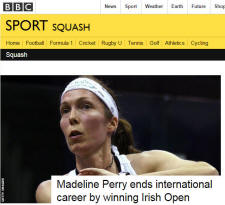



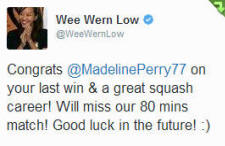
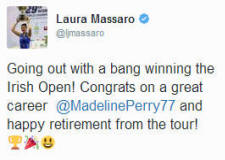

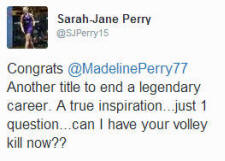
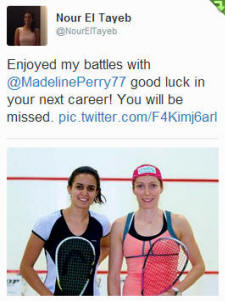 |